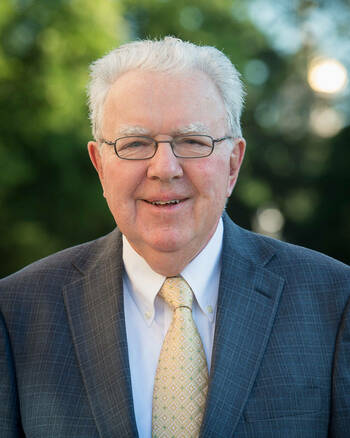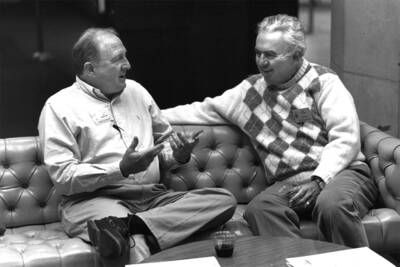In memoriam: Jay Patrick Dolan, Cushwa Center founder
 Jay P. Dolan at the University of Notre Dame in 2015 for the 40th anniversary celebration of the Cushwa Center’s founding.
Jay P. Dolan at the University of Notre Dame in 2015 for the 40th anniversary celebration of the Cushwa Center’s founding.Jay Patrick Dolan, founder of the Cushwa Center for the Study of American Catholicism at the University of Notre Dame, died May 7 in Salem, Oregon. He was 87 years old.
Dolan was born on March 17, 1936, in Bridgeport, Connecticut, to Joseph T. and Margaret (Reardon) Dolan. He graduated from Fairfield College Preparatory School before being ordained a priest in Rome in 1961 and earning his licentiate in sacred theology from the Pontifical Gregorian University in 1962. In 1966, he enrolled as a doctoral student at the University of Chicago Divinity School, where he studied under the renowned religion scholar Martin E. Marty and honed what was then a distinct approach to the history of American Catholicism, emphasizing the men and women who occupied the pews rather than the pulpits. He earned a doctorate in history in 1970.
“Jay Dolan’s pathbreaking mix of social and religious history marked a turn of direction for both fields,” said John T. McGreevy, the Charles and Jill Fischer Provost and Francis A. McAnaney Professor of History. “The same commitment to the lives of ordinary people marked many of his initiatives as the founding director of the Cushwa Center for the Study of American Catholicism, long the country’s premier center for such scholarship. He inspired young scholars, mentored colleagues (very much including myself) and educated generations of lucky Notre Dame undergraduates and graduate students. All of us at Notre Dame were lucky to have him in our midst, and we will all mourn his death.”
Dolan came to Notre Dame in 1971 as an assistant professor of history. In 1975, he launched the American Catholic Studies Newsletter and persuaded the University to create the Center for the Study of American Catholicism, and was named as its inaugural director in 1977.
In 1978, the Ancient Order of Hibernians in America committed perpetual funding for the center’s work, and in 1981, Dolan oversaw the center’s full endowment through the generosity of Charles and Margaret Hall Cushwa of Youngstown, Ohio. In the years to come, he guided research and publication projects, developed a series of travel and research grants and postdoctoral fellowships for scholars of Catholicism, and hosted regular lectures and conferences, most notably the semiannual Seminar in American Religion. Together, these initiatives established the center as the leading institutional home for the historical and interdisciplinary study of Roman Catholicism in the United States. He ultimately served as the center’s director for 16 years, stepping down from that role in 1993.
Dolan authored a number of foundational texts in the field of American Catholic studies, including “The Immigrant Church: New York Irish and German Catholics, 1815-1865” (Johns Hopkins, 1975), winner of the American Catholic Historical Association’s John Gilmary Shea Prize in 1976. In addition, he edited several projects, including the two-volume “The American Catholic Parish: A History from 1850 to the Present” (Paulist, 1987) and the three-volume “Notre Dame History of Hispanic Catholics” (Notre Dame, 1994).
“Jay Dolan almost single-handedly shifted the focus of Catholic historiography to the lives of ordinary immigrants in all their ethnic, racial and social diversity — their families and parishes, ‘neighborhood gods’ and cultural rituals, internal conflicts and eventual assimilation into a mainstream American society which, collectively, they transformed,” said R. Scott Appleby, Dolan’s successor at the Cushwa Center and now the Marilyn Keough Dean of the Keough School of Global Affairs and professor of history. “His magnum opus, ‘The American Catholic Experience,’ is a monumental synthesis of the groundbreaking research of a generation of social historians — many of whom Jay drew into the growing Cushwa Center network. A ‘people’s history,’ it was among the first and by far the most influential reinterpretation of American Catholic history in the wake of the Second Vatican Council. Jay was a mentor, a valued colleague and a dear friend. With many others whose lives he touched, I will miss him.”

A busy publication schedule did not distract Dolan from the classroom, where he instructed Notre Dame undergraduates in legendary classes such as The Irish-American Experience. He also directed a number of doctoral students and mentored a new generation of scholars through the Cushwa Center’s programs and outreach. Along the way, he held visiting appointments at institutions including Princeton University, University College Cork, Boston College and the University of Chicago, and he won distinguished prizes and fellowships from the Rockefeller Foundation, the American Catholic Historical Association, the American Council of Learned Societies and the Lilly Endowment. His scholarly achievements positioned him to interpret the American Catholic experience for a mass readership: Outlets such as the Chicago Tribune, the Los Angeles Times and The Washington Post sought his analysis for their religion reporting, and his reviews featured regularly in The New York Times during the 1990s.
Dolan retired in 2003, after which he remained active as a scholar and author, including the publication of “The Irish Americans: A History” (Bloomsbury, 2008). He continued to be an avid golfer and active member of Knollwood Country Club in Granger, Indiana, and Vero Beach Country Club in Florida, and he was also involved in numerous volunteer ministries, including with the Center for the Homeless in downtown South Bend, the Holy Cross Care and Rehabilitation Center, the Indian River Medical Center in Vero Beach, the VNA Hospice of Indian River County and the Arc of Indian River County, an organization devoted to serving individuals with special needs.
“Jay showed me how to teach and write history, how to do research, and how to support other scholars through the Cushwa Center. I learned from him that all of this work was critically important, and that it required time and patience to do it well,” said Cushwa Center director Kathleen Sprows Cummings. “Perhaps the most valuable lesson I learned from Jay, though, was that no matter how vital and significant our historical work was, when it came to building a happy and successful life, professional commitments mattered far less than caring for family, cultivating deep friendships and giving back to the community. He did all of those things exceptionally well. I couldn’t have asked for a better mentor and friend, and his death saddens me beyond measure.”
Dolan is survived by two children, Patrick J. Dolan (Ingrid) of Santa Fe, New Mexico, and Mark M. Dolan (Jacque) of Salem, Oregon, along with two grandchildren. He was preceded in death by his wife, Patricia McNeal Dolan, in 2018.
A funeral Mass will be held at 9:30 a.m. on June 16 at the Basilica of the Sacred Heart at Notre Dame, followed by burial at Cedar Grove Cemetery.
Originally published by at cushwa.nd.edu on May 11.
Latest Faculty & Staff
- Faculty receive prestigious early career awards from National Science FoundationDuring the 2024-25 academic year, four researchers in the University of Notre Dame’s Colleges of Engineering and Science received early-career awards from the National Science Foundation.
- In new research, Roy Scranton explores climate change and the limits of human progressIn his most recent book, “Impasse: Climate Change and the Limits of Progress,” Scranton, an associate professor of English, defines the impasse he sees as “not only political and institutional, but cognitive, existential and narrative” and asserts that the only path forward is through embracing what he terms ethical pessimism. “A lot of people confuse pessimism with nihilism, apathy and despair,” Scranton said. “But pessimism is actually about recognizing our limits, letting go of unrealistic goals, finding solidarity in the fact of human suffering and doing what you can now, not in some utopian future.
- Joule Bergerson, energy technology assessment expert, named new director of ND EnergyND Energy faculty director Joule…
- In memoriam: Alasdair MacIntyre, the Rev. John A. O’Brien senior research professor of philosophy emeritusAlasdair MacIntyre, the Rev. John A. O’Brien senior research professor of philosophy emeritus and a permanent senior distinguished research fellow at the de Nicola Center for Ethics and Culture, died on May 21, 2025. He was 96.
- Santiago Schnell, dean of Notre Dame’s College of Science, appointed as provost of DartmouthSantiago Schnell, the William K. Warren Foundation Dean of the College of Science at the University of Notre Dame, has accepted an appointment as provost at Dartmouth College. He will depart Notre Dame at the end of June and begin his new role in July.
- Notre Dame’s Fightin’ Irish Battalion receives Department of Defense award as nation’s top Army ROTC programThe United States Department of Defense honored the University of Notre Dame’s Army ROTC Fightin’ Irish Battalion as the nation’s top Army collegiate program for the 2023-24 academic year. This will be the first time the unit has received the department’s Educational Institution Partnership Excellence Award, which recognizes the program’s achievements in recruiting, educating, training and commissioning leaders of character to be the next generation of military officers.












